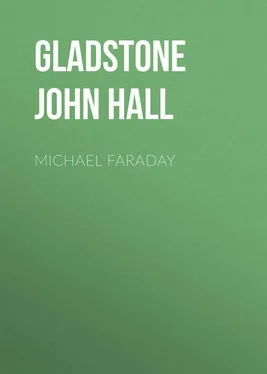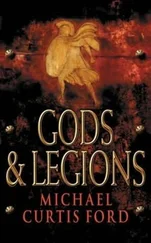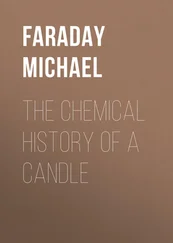John Gladstone - Michael Faraday
Здесь есть возможность читать онлайн «John Gladstone - Michael Faraday» — ознакомительный отрывок электронной книги совершенно бесплатно, а после прочтения отрывка купить полную версию. В некоторых случаях можно слушать аудио, скачать через торрент в формате fb2 и присутствует краткое содержание. Жанр: foreign_antique, foreign_prose, на английском языке. Описание произведения, (предисловие) а так же отзывы посетителей доступны на портале библиотеки ЛибКат.
- Название:Michael Faraday
- Автор:
- Жанр:
- Год:неизвестен
- ISBN:нет данных
- Рейтинг книги:5 / 5. Голосов: 1
-
Избранное:Добавить в избранное
- Отзывы:
-
Ваша оценка:
- 100
- 1
- 2
- 3
- 4
- 5
Michael Faraday: краткое содержание, описание и аннотация
Предлагаем к чтению аннотацию, описание, краткое содержание или предисловие (зависит от того, что написал сам автор книги «Michael Faraday»). Если вы не нашли необходимую информацию о книге — напишите в комментариях, мы постараемся отыскать её.
Michael Faraday — читать онлайн ознакомительный отрывок
Ниже представлен текст книги, разбитый по страницам. Система сохранения места последней прочитанной страницы, позволяет с удобством читать онлайн бесплатно книгу «Michael Faraday», без необходимости каждый раз заново искать на чём Вы остановились. Поставьте закладку, и сможете в любой момент перейти на страницу, на которой закончили чтение.
Интервал:
Закладка:
He took his bride home to Albemarle Street, and there they spent their wedded life; but until Mr. Barnard's death it was their custom to go every Saturday to the house of the worthy silversmith, and spend Sunday with him, returning home usually in the evening of that day. His own father died while he was at Riebau's, but his mother, a grand-looking woman, lived long afterwards, supported by her son, whom she occasionally visited at the Institution, and of whose growing reputation she was not a little proud.
With a mind calmed and strengthened by this beautiful domestic life, he continued with greater and greater enthusiasm to ask questions of Nature, and to interpret her replies to his fellow-men. Just before his marriage he had been appointed at the Royal Institution superintendent of the house and laboratory, and in February 1825, after a change in the management of the Institution, he was placed as director in a position of greater responsibility and influence. One of his first acts in this capacity was to invite the members to a scientific evening in the laboratory; this took place three or four times in 1825, and in the following years these gatherings were held every week from Feb. 3 to June 9; and though the labour devolved very much upon Faraday, other philosophers sometimes brought forward discoveries or useful inventions. Thus commenced those Friday evening meetings which have done so much to popularize the high achievements of science. Faraday's note-books are still preserved, containing the minutes of the committee-meetings every Thursday afternoon, the Duke of Somerset chairman, and he secretary; also the record of the Friday evenings themselves, who lectured, and on what subject, and what was exhibited in the library, till June 1840, when other arrangements were probably made.
The year 1827 was otherwise fruitful in lectures: in the spring, a course of twelve on chemical manipulation at the London Institution; after Easter, his first course at Albemarle Street, six lectures on chemical philosophy (he had helped Professor Brande in 1824); 3 3 Sir Roderick Murchison used to tell how he was attending Brande's lectures, when one day, the Professor being absent, his assistant took his place, and lectured with so much ease that he won the complete approval of the audience. This, he said, was Faraday's first lecture at the Royal Institution.
and at Christmas, his desire to convey knowledge, and his love to children, found expression in a course of six lectures to the boys and girls home for their holidays. These were a great success; indeed, he himself says they "were just what they ought to have been, both in matter and manner, – but it would not answer to give an extended course in the same spirit." He continued these juvenile lectures during nineteen years. The notes for courses of lectures were written in school copy-books, and sometimes he appends a general remark about the course, not always so favourable as the one given above. Thus he writes, "The eight lectures on the operations of the laboratory, April 1828, were not to my mind." Of the course of twelve in the spring of 1827, he says he "found matter enough in the notes for at least seventeen."
Up to 1833 Faraday was bringing the forces of nature in subjection to man on a salary of only 100 l. per annum, with house, coals, and candles, as the funds of the Institution would not at that time afford more; but among the sedate habitúes of the place was a tall, jovial gentleman, who lounged to the lectures in his old-fashioned blue coat and brass buttons, grey smalls, and white stockings, who was a munificent friend in need. This was John Fuller, a member of Parliament. He founded a Professorship of Chemistry with an endowment that brings in nearly 100 l. a year, and gave the first appointment to Faraday for life. When the Institution became richer, his income was increased; and when, on account of the infirmities of age, he could no longer investigate, lecture, or keep accounts, the managers insisted on his still retaining in name his official connection with the place, with his salary and his residence there. Nor indeed could they well have acted otherwise; for though the Royal Institution afforded in the first instance a congenial soil for the budding powers of Faraday, his growth soon became its strength; and eventually the blooming of his genius, and the fruit it bore, were the ornament and glory of the Institution.
It will be asked, Was this 100 l. or 200 l. per annum the sole income of Faraday? No; in early days he did commercial analyses, and other professional work, which paid far better than pure science. In 1830 his gains from this source amounted to 1,000 l. , and in 1831 to considerably more; they might easily have been increased, but at that time he made one of his most remarkable discoveries – the evolution of electricity from magnetism, 4 4 The laboratory note-book shows that at this very time he was making a long series of commercial analyses of saltpetre for Mr. Brande.
– and there seemed to lie open before him the solution of the problem how to make one force exhibit at will the phenomena of magnetism or of common or voltaic electricity. And then he had to face another problem – his own mental force might be turned either to the acquisition of a fortune, or to the following up of those great discoveries; it would not do both: which should he relinquish? The choice was deliberately made: Nature revealed to him more and more of her secrets, but his professional gains sank in 1832 to 155 l. 9 s. , and during no subsequent year did they amount even to that.
Still his work was not entirely confined to his favourite studies. In a letter to Lord Auckland, long afterwards, he says: – "I have given up, for the last ten years or more, all professional occupation, and voluntarily resigned a large income that I might pursue in some degree my own objects of research. But in doing this I have always, as a good subject, held myself ready to assist the Government if still in my power, not for pay ; for, except in one instance (and then only for the sake of the person joined with me), I refused to take it. I have the honour and pleasure of applications, and that very recently, from the Admiralty, the Ordnance, the Home Office, the Woods and Forests, and other departments, all of which I have replied to, and will reply to as long as strength is left me." He had declined the Professorship of Chemistry at the London University – now University College, – but in 1829 he accepted a lectureship at the Royal Academy, Woolwich, and held it for about twenty years. In 1836 he became scientific adviser to the Trinity House, and his letter to the Deputy Master also shows his feelings in reference to such employment: – "You have left the title and the sum in pencil. These I look at mainly as regards the character of the appointment; you will believe me to be sincere in this, when you remember my indifference to your proposition as a matter of interest, though not as a matter of kindness . In consequence of the goodwill and confidence of all around me, I can at any moment convert my time into money, but I do not require more of the latter than is sufficient for necessary purposes. The sum, therefore, of 200 l. is quite enough in itself, but not if it is to be the indicator of the character of the appointment; but I think you do not view it so, and that you and I understand each other in that respect; and your letter confirms me in that opinion. The position which I presume you would wish me to hold is analogous to that of a standing counsel." For nearly thirty years Faraday continued to report on all scientific suggestions and inventions connected with lighthouses or buoys, not for personal gain or renown, but for the public good. His position was never above that of a "standing counsel." In his own words: "I do not know the exact relation of the Board of Trade and the Trinity House to each other; I am simply an adviser upon philosophical questions, and am put into action only when called upon."
Читать дальшеИнтервал:
Закладка:
Похожие книги на «Michael Faraday»
Представляем Вашему вниманию похожие книги на «Michael Faraday» списком для выбора. Мы отобрали схожую по названию и смыслу литературу в надежде предоставить читателям больше вариантов отыскать новые, интересные, ещё непрочитанные произведения.
Обсуждение, отзывы о книге «Michael Faraday» и просто собственные мнения читателей. Оставьте ваши комментарии, напишите, что Вы думаете о произведении, его смысле или главных героях. Укажите что конкретно понравилось, а что нет, и почему Вы так считаете.












